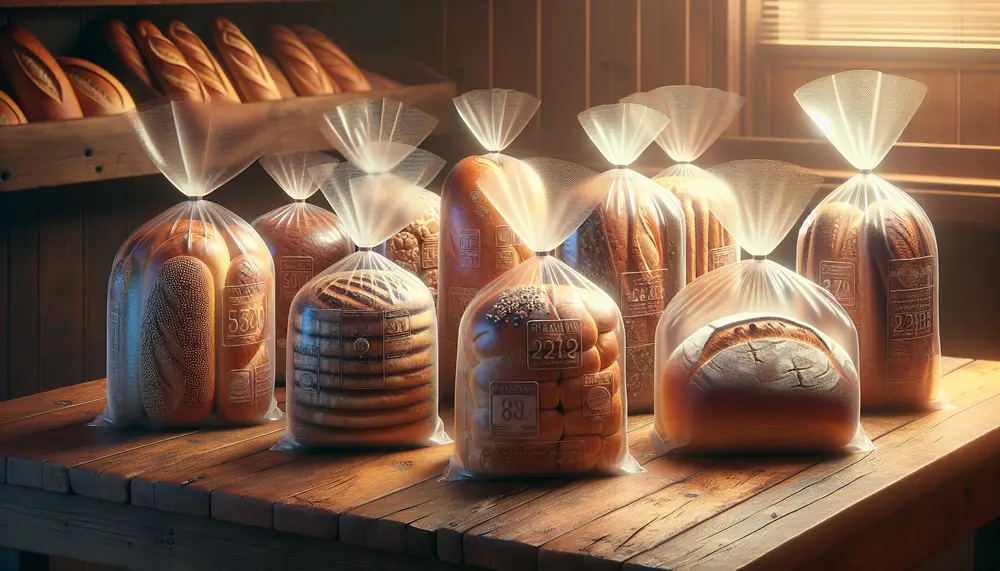Table of Contents:
Understanding the Importance of Bread Bags for Bakery Freshness
Bread is a staple in many diets around the world, but keeping it fresh remains a challenge for both bakeries and consumers. Freshness is key to the appeal of bakery products, and bread bags play a crucial role in maintaining that allure. But why are these bags so important? The answer lies in the way they protect the bread from environmental elements.
Environmental factors such as air, moisture, and temperature can quickly degrade the quality of bread, leading to staleness or mold. A well-designed bread bag acts as a barrier, shielding the bread from humidity and contaminants. By sealing in the freshness, these bags help to prolong the shelf life of bakery items, allowing customers to enjoy their purchases for longer.
Furthermore, bread bags are not just about preservation; they're also an extension of the bakery's brand. The right packaging can convey a sense of quality and attention to detail, influencing a customer's purchasing decision. It's an opportunity for bakeries to showcase their commitment to quality and to create a memorable customer experience.
In summary, the importance of bread bags extends beyond practicality. They are a vital tool for ensuring product integrity, enhancing customer satisfaction, and ultimately contributing to a bakery's success.
Exploring the Features of Organic Cotton Artisan Bread Bags
The move towards sustainable and eco-friendly practices has led many bakeries to reconsider their packaging options. Organic cotton artisan bread bags stand out in this context, offering numerous features that benefit both the consumer and the environment. Let's delve into what sets these bags apart.
Firstly, the organic cotton used in these bags is GOTS-certified, ensuring it meets high ecological and social standards from harvesting to manufacturing. Not only does this certification reassure consumers about the ethical sourcing of the material, but it also indicates a reduced environmental impact compared to conventional cotton.
The design of these bread bags caters to different bakery needs as well. The set typically includes a baguette bag, designed to fit the elongated shape of a baguette, and a loaf bag, which suits various types of bread. This versatility is vital for bakeries that offer a wide range of products.
Another feature is the reusability of these bags. They can be washed in cold water, by hand or machine, making them easy to clean and maintain. Although they may shrink slightly after the first wash, this is a natural characteristic of organic cotton and does not detract from the bag's effectiveness.
Ultimately, these organic cotton bread bags are not just containers for baked goods; they are thoughtfully crafted storage solutions that put sustainability at the forefront while offering practical benefits for everyday use.
Exploring the Impact of Innovative Packaging on Bakery Freshness
| Pros of Innovative Bread Bags | Cons of Innovative Bread Bags |
|---|---|
| Enhanced shelf life of bread products | Potential increase in cost |
| Reduction of food waste | Possible environmental impact if not recyclable |
| Improved freshness for a better customer experience | May require additional staff training for proper use |
| Can be marketed as a unique selling point | Cultural resistance to new packaging styles |
| Protects bread from contaminants and humidity | Design limitations due to functionality focus |
How to Use Bread Bags for Optimal Bread Storage
Securing the longevity of bread’s freshness is a pertinent concern for anyone who appreciates the essence of a good loaf. Proper storage is instrumental, and using bread bags effectively can help achieve this. Here’s a straightforward guide on how to use bread bags to enhance the longevity of your bread.
- Upon purchasing or baking bread, allow it to cool completely before storing. Warm bread can lead to condensation, which might foster mold growth.
- If the bread is pre-sliced, place the cut side down in the bag to minimize air exposure.
- Eradicate as much air as possible from the bag before sealing it to hinder oxidation and prevent staling.
- Store the bread at room temperature for short-term use. Bread bags are superb for maintaining freshness without the need for refrigeration, which can actually expedite the staling process due to retrogradation.
- For long-term storage, bread bags can also be used in the freezer. Ensure the bag is well-sealed to avoid freezer burn. When ready to use, thaw the bread at room temperature while still in the bag to retain moisture.
The right technique, paired with the superior quality of bread bags, ensures your bakery’s bread remains as delectable as the day it was baked, ultimately maximizing consumer enjoyment and reducing food waste.
The Benefits of Using GOTS-Certified Organic Cotton for Bread Bags
Choosing the right materials for bread bags can significantly affect not only the freshness of the bread but also the environmental footprint of the packaging. Utilizing GOTS-certified organic cotton for bread bags comes with multiple benefits, which align with both health and ecological standards.
- Safety and Purity: Organic cotton is grown without the use of toxic pesticides or synthetic fertilizers, making it a safer choice for consumers. It also means that the bread within is not in contact with substances that could potentially harm one's health.
- Environmental Sustainability: By choosing GOTS-certified cotton, bakeries and consumers support farming practices that are better for soil health and biodiversity. Organic cultivation consumes less water and energy than conventional cotton farming, thus conserving natural resources.
- Quality and Durability: Organic cotton is known for its high quality, which often translates into greater durability. This means that bread bags made from GOTS-certified organic cotton can be reused multiple times, reducing the need for disposable bags and the waste associated with them.
- Social Responsibility: GOTS certification also ensures that the cotton is harvested and manufactured in a socially responsible manner, respecting the labor rights of workers and providing them with a fair wage.
Opting for GOTS-certified organic cotton bread bags is not just a choice for better bread storage; it's a step towards a more sustainable and ethical world.
Eco-Friendly Packaging: A Closer Look at Bread Bag Materials
Eco-friendly packaging is more than a trend; it's a commitment to the future of our planet. In the baking industry, selecting the right materials for bread bags is a crucial decision that affects both product quality and environmental impact. Let's examine the materials that make bread bags both functional and sustainable.
Many bakeries are turning to materials such as biodegradable and compostable options, including plant-based plastics and natural fibers. These materials break down over time without leaving harmful residues, making them a superior choice compared to traditional plastics.
Natural fibers, such as jute or hemp, are also gaining popularity for their minimal environmental impact during production and after disposal. These materials are not only sturdy, but they also offer breathability, which is crucial for preventing moisture buildup and maintaining the crispness of the bread crust.
In addition, some bread bags are being designed for multiple uses, encouraging consumers to reduce waste by reusing their bags. Innovations such as silicone coatings or beeswax treatments on cloth bags have emerged, which can extend the life of the bag while still ensuring the packaging remains eco-friendly.
The move towards materials that prioritize sustainability without compromising on quality reflects the growing consumer demand for environmentally responsible products. By being aware of the materials used in bread bags, bakeries can make informed decisions that resonate with eco-conscious customers.
Caring for Your Bread Bags: Tips and Best Practices
Maintaining the condition of your bread bags is essential to ensure they perform effectively over time. Proper care extends their lifespan and maintains the freshness of your bread. Here are some tips and best practices for caring for your bread bags:
- After each use, shake out any crumbs from the bag to prevent mold growth.
- If the bag becomes damp or soiled, let it air dry completely before the next use to discourage bacterial growth.
- In the instance of visible soiling, lightly spot clean the area or wash the whole bag following the manufacturer's instructions.
- Avoid using hot water or harsh chemicals that can break down natural fibers and affect the bag’s integrity and breathability.
- For bread bags that are suitable for machine washing, use a gentle cycle and opt for an eco-friendly detergent.
- Line dry your bread bags to prevent shrinkage and preserve their shape, as high heat from dryers can damage the material.
- When not in use, store your bread bags in a dry, cool place to prevent mildew and maintain the material's quality.
By following these simple care instructions, you can keep your bread bags in the best condition for storing your bakery goods while also contributing to eco-friendly practices.
The Manufacturing Process: Combining Sustainability and Quality
Today's consumers demand products that are not only high in quality but also produced with a commitment to sustainability. The manufacturing process for bread bags can harmonize these two important attributes. A transparent and conscientious approach to manufacturing can serve as a hallmark of a brand's integrity and ecological responsibility.
It begins with selecting raw materials that meet stringent environmental and social standards. Sustainable manufacturing involves sourcing fibers that are renewable and have a lower ecological footprint. The process includes employing methods that conserve resources like water and energy, and that minimize waste.
During production, sustainability means utilizing energy-efficient machinery and reducing emissions. It also entails implementing practices that reduce the carbon footprint, such as local sourcing and optimizing transport logistics.
Quality control is integral, ensuring that each bread bag meets specific standards for durability and performance. Rigorous testing for strength and longevity ensures that the bags not only meet the customers' needs but also uphold the brand’s commitment to excellent craftsmanship.
Lastly, the finished bread bags are packaged in materials that match the sustainability ethos, such as recyclable or compostable containers. Every step in the manufacturing process, from material selection to final packaging, reflects the dedication to crafting a product that is responsible, reliable, and respectful of both the consumer and the planet.
Complementary Products to Enhance Your Bread Storage Solutions
Bread bags are just one piece of the puzzle when it comes to optimal bread storage. To truly elevate the experience of preserving and enjoying your bakery items, a range of complementary products can be utilized. These products work in tandem with bread bags to ensure your bread remains as fresh as the day it was baked.
- Reusable Silicone Bowl Covers: Perfect for covering dough as it rises or keeping cut loaves fresh, these covers provide a tight seal and are an eco-friendly alternative to plastic wrap.
- Upcycled Jute Potholders: These handy potholders can be used when handling hot bread pans or as a rustic placemat under your bread basket.
- Home Baker Bread Storage Kit: A comprehensive kit may include a variety of bags, wraps, and tools designed for the home baker keen on achieving professional-level bread storage.
- Reusable Silicone Cupcake Liners & Baking Cups: While primarily for baking, these liners can double as separators to keep small bread rolls or pastries organized and prevent them from drying out.
- Vegan Wax Wraps: An alternative to plastic, these wraps can cover and protect various baked goods with ease, and they adhere snugly around bread or dishes with a warm hand.
Investing in these additional products can greatly enhance your bread storage solutions. Not only do they contribute to maintaining the freshness of your baked goods, but they also align with the values of sustainability and waste reduction.
Simple Ecology: A Brand Committed to Environmental Responsibility
In a market filled with brands claiming eco-consciousness, Simple Ecology stands out with a verifiable track record of environmental responsibility. This brand’s ethos is rooted deeply in the production of sustainable goods, and its dedication to the cause is evident in every product offered.
Recycling Program for Silicone: Simple Ecology has taken an innovative approach to the life cycle of their products by offering a recycling program. This initiative encourages users to return their silicone items at the end of their life span, ensuring the materials are disposed of responsibly or repurposed effectively.
Product Design and Supply Chain: The company takes pride in designing products that cater to ecological standards without sacrificing quality or functionality. Equal attention is given to ethical supply chain management, ensuring that the manufacturing processes align with the company's green philosophy.
With a brand like Simple Ecology, consumers can trust that they are supporting a business that not only talks about environmental stewardship but also puts it into practice. This commitment is what sets Simple Ecology apart as a leader in the movement towards a more sustainable future.
Navigating the Simple Ecology Website for Your Bread Bag Needs
Finding the right bread bags to suit your needs doesn't have to be a complex endeavor. The Simple Ecology website provides a user-friendly interface that simplifies the process of discovering and purchasing sustainable bread storage options.
Upon visiting the website, customers can easily access detailed information about each product. The descriptions include specifications about size, materials, and recommended uses, helping you make an informed decision. Products are organized intuitively, allowing for effortless browsing.
For those interested in learning more about the company’s sustainability efforts or how to participate in recycling programs, the website contains sections dedicated to these topics. Customers can also find care instructions for products and tips to enhance their bread storage approach.
Simple Ecology also offers secure checkout options and transparent information on shipping policies, ensuring a smooth transaction from product selection to delivery. The company's commitment to customer satisfaction is reflected in their online presence, making it a convenient one-stop-shop for all your eco-friendly bread bag needs.
Bakery Freshness Preserved: Smart Bread Bag Solutions
Why are innovative bread bags essential for bakeries?
Innovative bread bags are essential for bakeries as they prolong the shelf life of bread products, maintain freshness, enhance customer satisfaction, and serve as a branding tool. They also offer unique selling points such as eco-friendliness and can protect bread from contaminants and humidity.
What materials are used for eco-friendly bread bags?
Eco-friendly bread bags are typically made from biodegradable, compostable materials like plant-based plastics or natural fibers such as cotton, jute, or hemp. Some bags also feature silicone coatings or beeswax treatments for added durability while maintaining eco-friendly properties.
How do GOTS-certified organic cotton bread bags benefit consumers and the environment?
GOTS-certified organic cotton bread bags offer consumers a safer, more durable packaging option grown and manufactured via socially-responsible means. Environmentally, they support sustainable farming practices, which benefits soil health, conservation of resources, and reduces the carbon footprint.
How can bakeries enhance their bread storage solutions beyond bread bags?
Bakeries can enhance storage solutions by using complementary products like reusable silicone bowl covers for a tight seal, vegan wax wraps for cover flexibility, and upcycled jute potholders for heat protection. These items help maintain freshness and align with sustainability goals.
What are the best practices for caring for reusable bread bags?
To care for reusable bread bags, shake out any crumbs after use, air dry them completely if damp, gently spot clean or machine wash as recommended, avoid hot water and harsh detergents, line dry to prevent shrinkage, and store them in a dry, cool place when not in use.






